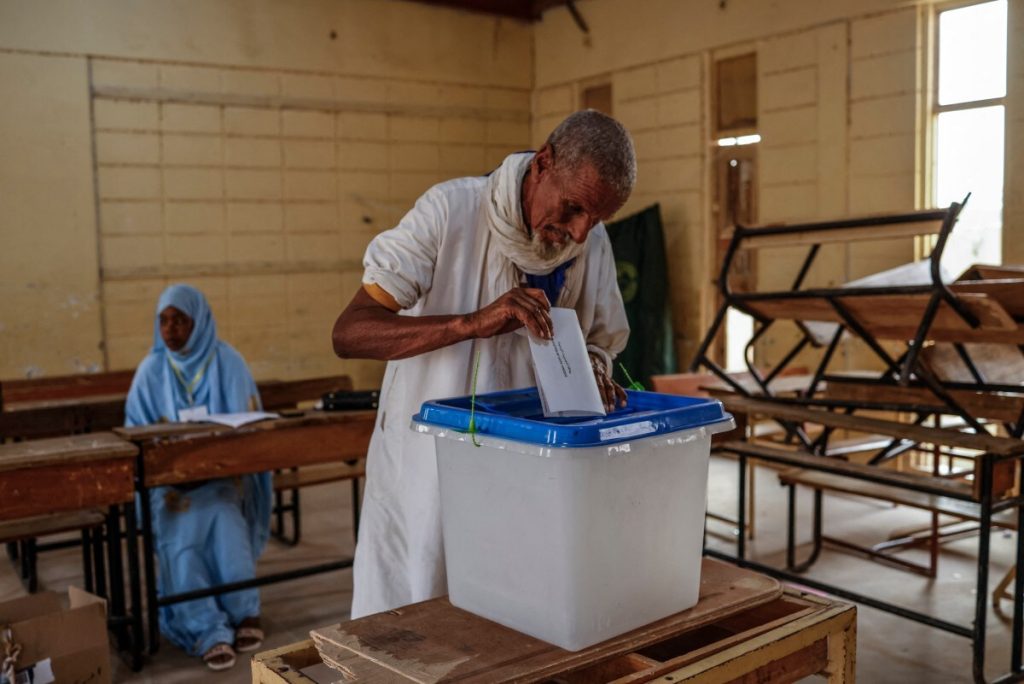Mauritanians headed to the polls on Saturday in a crucial presidential election, with incumbent Mohamed Ould Cheikh El Ghazouani seeking a second term. The vote is seen as a litmus test for democracy in this West African nation, which has emerged as a rare island of stability in the turbulent Sahel region.
Mauritanians flocked to polling stations on Saturday to cast their ballots in a pivotal presidential election. Incumbent Mohamed Ould Cheikh El Ghazouani seeks re-election in this desert nation, which has remained a beacon of stability amidst the tumultuous Sahel region.
Nearly 1.9 million registered voters will choose from seven candidates vying to lead this sprawling country. Mauritania has largely resisted the wave of jihadism sweeping the region and is poised to become a significant gas producer.
In the heart of Nouakchott, the capital, journalists observed voters queueing at two school-based polling stations before voting commenced at 0700 GMT. Men and women formed separate lines, reflecting the deeply conservative Islamic traditions of the nation.
Mohamed Salem M’Seika, a 50-year-old voter, expressed his commitment: “I am here to fulfil my civic duty to complete the democratic process that began some decades back.”
Another voter, 26-year-old Kertouma Baba, shared his aspirations: “progress in education and opportunities for the youth”.
Polls will close at 1900 GMT, with initial results expected Saturday evening. Official results will be announced on Sunday or Monday.
The 2019 election that brought Ghazouani to power marked a historic moment – the first peaceful transition between elected presidents since Mauritania gained independence from France in 1960, following a series of coups from 1978 to 2008.
Former general Ghazouani is the clear frontrunner for a second term. Observers believe a first-round victory is possible, given the fragmented opposition and the incumbent’s substantial resources.
If needed, a second-round vote will occur on July 14.
The campaign period was largely peaceful, marred only by minor scuffles in the northern town of Nouadhibou on Monday. The interior ministry reported that supporters of one candidate clashed with backers of another.
At his final rally, Ghazouani issued a stern warning: “Authorities are ready to face any attempt at creating disorder, as security is Mauritanians’ utmost priority.”
As the former security chief and army leader, Ghazouani is widely credited for the country’s relative stability. While neighbouring Sahel countries have faced military coups and escalating jihadism, particularly in Mali, Mauritania has remained attack-free since 2011.
Throughout his campaign, Ghazouani confidently promised supporters “a resounding first-round victory”. His campaign posters, bearing the slogan “the safe choice”, dominate Nouakchott and the country at large.
After a first term challenged by the COVID-19 pandemic and the Ukraine war, Ghazouani has prioritised poverty reduction and youth support. This focus is crucial in a country where over 70% of the population is under 35, with many young people tempted by prospects abroad.
Ghazouani aims to implement further reforms in his second term, buoyed by a positive economic outlook. The World Bank projects average growth of 4.9% (3.1% per capita) for 2024-2026, driven by gas production starting later this year. Inflation has declined from 9.5% in 2022 to 5% in 2023, with further drops expected.
The president faces two main challengers: human rights activist Biram Dah Abeid, who finished second in the last two presidential elections, and Hamadi Ould Sid’ El Moctar, leader of the Islamist Tewassoul party.
Both opposition candidates promise sweeping changes, vowing to end “mismanagement and corruption” and implement extensive education and justice reforms.
However, they’ve raised concerns about potential fraud, denouncing a “one-sided election” and accusing the Independent National Electoral Commission (CENI) of failing to ensure a fair process.
The opposition vigorously contested last year’s legislative elections, which Ghazouani’s party won.
International observation is limited, with the African Union sending 27 short-term observers, while the European Union has deployed just three election experts.
The Mauritanian government has established a national election monitoring body, but the opposition dismisses it as a tool for ballot manipulation.
As Mauritanians cast their votes, the outcome of this election will not only shape the country’s future but also influence stability in the wider Sahel region.

